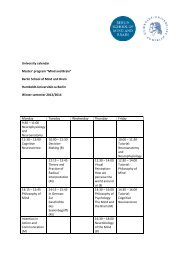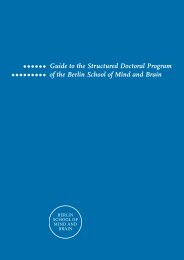Download - Berlin School of Mind and Brain
Download - Berlin School of Mind and Brain
Download - Berlin School of Mind and Brain
You also want an ePaper? Increase the reach of your titles
YUMPU automatically turns print PDFs into web optimized ePapers that Google loves.
Georgina Torbet<br />
Cognitive Neuroscience Approaches to Freudian Repression<br />
This presentation will discuss the methods through which the empirical sciences may<br />
investigate psychoanalytic constructs, focusing particularly on repression. While<br />
repression is a well-known clinical phenomenon, it lacks a robust evidence base <strong>and</strong> is<br />
difficult to reconcile with current knowledge <strong>of</strong> experimental psychology. We have<br />
attempted to frame repression in terms <strong>of</strong> mechanisms which are well understood in<br />
cognitive neuroscience, in order to investigate this subject experimentally <strong>and</strong> to gather<br />
empirical data on it.<br />
We have built upon experiments in directed forgetting, in which people intentionally<br />
forget material which they had previously learned when instructed to do so. We have<br />
replicated this well-known effect, <strong>and</strong> exp<strong>and</strong>ed the paradigm to include cues given in a<br />
non-conscious way. Through innovative use <strong>of</strong> subliminal stimuli, we have attempted to<br />
demonstrate that unconscious cues can effect memory <strong>and</strong> induce forgetting. Some<br />
preliminary results will be presented, <strong>and</strong> implications for the empirical study <strong>of</strong><br />
psychoanalytic phenomena will be discussed.<br />
Joachim Lipski<br />
The Role <strong>of</strong> Neuroscientific Findings in Ascribing Intentional States<br />
The role <strong>of</strong> intentional terminology in neuroscientific contexts, one <strong>of</strong> the most crucial<br />
links between philosophy <strong>and</strong> the neurosciences, is still lacking a proper theoretical<br />
foundation. Available proposals range from a simple identification <strong>of</strong> intentional<br />
statements with corresponding neurological statements, to a more-or-less strictly causally<br />
moderated relationship, to denying the neurosciences the use <strong>of</strong> such terminology at all.<br />
Subscribing to any <strong>of</strong> these views will have a significant bearing on the role that<br />
neuroscientific findings play in the potential ascription <strong>of</strong> intentional properties, <strong>and</strong> the<br />
fact that these views are competing has led to many a controversial debate. Personally, I<br />
suggest that many <strong>of</strong> these proposals, while being mutually exclusive in their elaborated<br />
forms, have put forward valuable points which can be constructively integrated into a<br />
theory <strong>of</strong> translation between neuroscientific terms, ins<strong>of</strong>ar as they pertain to intentional<br />
phenomena, <strong>and</strong> intentional terms, such as they are being used in analytic philosophy.<br />
14





